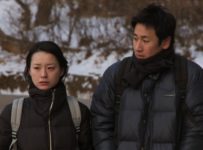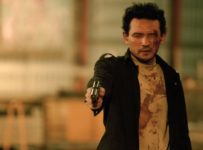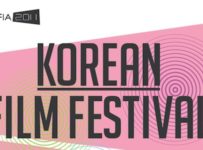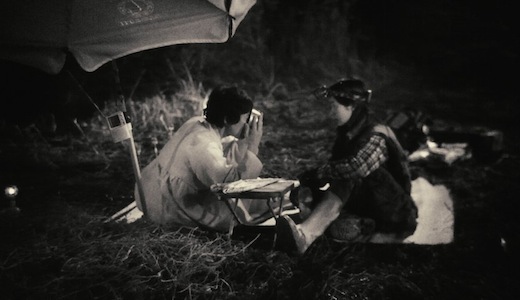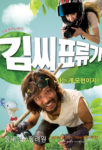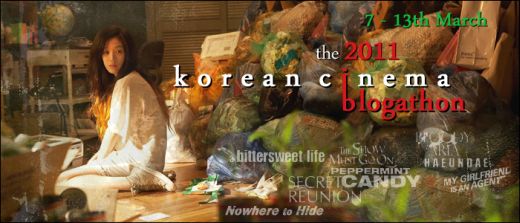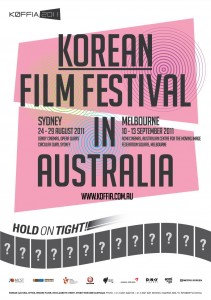 Australia’s premiere showcase of Korean cinema, the Korean Film Festival in Australia (KOFFIA) returns for a second year, expanding its operations to Sydney and Melbourne and offering 13 feature films and 7 shorts from the emerging cinema of South Korea.
Australia’s premiere showcase of Korean cinema, the Korean Film Festival in Australia (KOFFIA) returns for a second year, expanding its operations to Sydney and Melbourne and offering 13 feature films and 7 shorts from the emerging cinema of South Korea.
KOFFIA will see the Australian premiere of a number of high-profile and award-winning films, including the award-winning Park Chan-wook short film, Night Fishing. The films will span seven themes, including Bloody Friday, Indie Cinema, Extraordinary Ordinary Families, Masters and Students, Brothers Divided, Ride the Dream and Crime and Punishment. So what treats does KOFFIA have in store for Sydneysiders, Melburnians and pilgrims alike over the week of dizzying delights at Sydney’s Dendy Opera Quays and Melbourne’s ACMI?
Opening Night
Already making a splash at the Melbourne International Film Festival, Ryoo Seung-wan’s massive hit The Unjust is sure to make a similar impact when it makes its Sydney debut. Marking the first time since 2006’s The City of Violence that brothers Ryoo Seung-Wan and Ryoo Seung-Bum worked together on a film, the film earned Ryoo Seung-wan best Director at the Director’s Cut Awards of the Korea Film Director’s Network. The MIFF program describes The Unjust as a “a complex crime thriller” that “blends cynical social observations with dark humour, tragedy and distinctively Korean action”. Even more exciting is that Ryoo Seung-wan and Producer Kang Hye-jeong will be visiting Australia for a Q & A. Definitely snatch up tickets for your chance to see this on the big screen.
Program
There is a little bit of something for everyone in the KOFFIA 2011 program. Whether you are into Korean cinema, or just like a good film, each of these is sure to appeal to cinema lovers everywhere.
Secret Reunion (2010, Dir: Jang Hun) – Starring Song Kang-Ho, star of Thirst and The Host, and directed by Jang Hun (Rough Cut, KOFFIA 2010) brings North and South spies into conflict as Song goes head-to-head with Gang Dong-Won (Woochi) in this politically charged thriller set in metropolitan Seoul. We managed to get a look at this on the program launch night, and it is definitely in keeping with the Brothers Divided theme.
The Man From Nowhere (2010, Dir: Lee Jeong-Beom) – The #1 hit at the Korean box office for five weeks straight last year, The Man from Nowhere was one of the biggest Korean hits of 2010. Sweeping the Korean Film Awards, including Best Actor for Won Bin (Mother) and Best New Actress for Kim Se-Ron, this one is a must-see at KOFFIA 2011.
The Journals of Musan (2010, Dir: Park Jung-bum) – Another darling of the festival circuit, also fresh from MIFF, this intimate portrait of two North Korean defectors living in the outskirts of Seoul (based on director Park Jung-bum’s own friend), it won both the New Current Award and the FIPRESCI Award at the Pusan International Film festival last year.
No Blood No Tears with Q&A (2002, Dir: Ryoo Seung-Wan) – A classic from the archives, this is The Unjust director Ryoo Seung-Wan’s 2002 sophomore effort as a director. Although this has been available on DVD for some time, this is a terrific chance to see it on the big screen. It will be accompanied by a Q & A.
Bedevilled (2010, Dir: Jang Cheol-su) – It wouldn’t be a Korean film festival without soem gruesome thrills, and the tale of a remote island filled with the dregs of humanity and bloody revenge. It has been described as “the most shocking and disturbing films from Korea since the notorious Old Boy“. We’re sold.
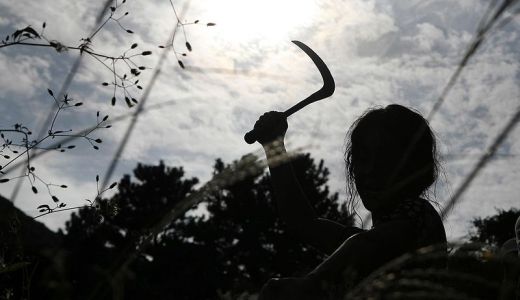
Earth’s Women with Forum (2009, Dir: Kwon Woo-jeong) – The kind of powerful documentary that is only available at film festivals, this sounds like a fascinating piece that follows three college girlfriends who abandon city in favour of a rural existence, each with their own expectations and agendas. The Good Life this ain’t. The Sydney screening will be accompanied by a forum that will feature Richard Gray of The Reel Bits and our good friend Matt Ravier (The Festivalists) on the panel, discussing Korean film distribution in Australia.
The Show Must Go On (2006, Dir: Han Jae-rim) – The aforementioned Song Kang-ho won best actor for this at the 2007 Critic’s Choice Awards, showcasing his versatility as an actor. The film also won Best Picture and Best Actor at the 28th Blue Dragon Film Awards.
Shim’s Family (2007, Dir: Jeong Yool-Cheol) – Also known as Skeletons in the Closet, and an apt entry for the ‘Extraordinary Ordinary Families’ stream, as it describes the very nature of the extended family in contemporary Korean society.
Oki’s Movie (2010, Dir: Hong Sang-soo) – With Hong Sang-soo’s The Day He Arrives currently doing the festival circuit, his film from last year is yet to get much of screening in Australia beyond the recent MIFF showing. Centering on Oki, a college student majoring in filmmaking, this is sure to be another of Hong Sang-soo’s films that are designed to showcase his love of cinema, and ignite the same passion in the audience.
The festival will also feature Shorts on the Park at the Korean Cultural Office on Sydney’s Elizabeth Street. The shorts will include the Berlin Film Festival Silver Bear winner for Best Short Film Broken Night, along with Judgement, Team Work and Audition.
The second Young Korean Filmmakers in Australia (YKFA) Awards will screen with the Cannes Award-winning Blue, along with Park Chan-wook’s Berlin Film Festival Golden Bear-winning Night Fishing. The Ride the Dream stream will also feature a schools only session of Bunt (playing in season during the Melbourne Festival). You’ll also get a chance to see the Park Chan-wook’s classic North-South film J.S.A: Joint Security Area in 35 mm, complete with a forum.
Closing Night
A Barefoot Dream plays with the Closing Ceremony, which also opens the Melbourne leg of the festival. Telling the true story of a Korean soccer coach who gave hope to underprivileged children in East Timor through the ‘beautiful game’, it is sure to provide the ‘feel good’ vibe that makes a closing night great.
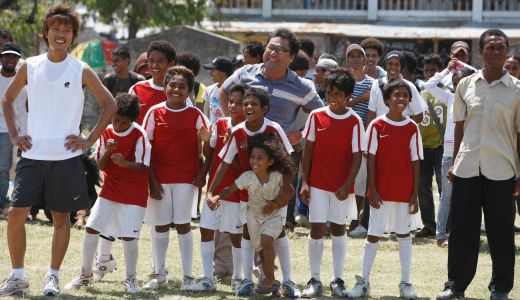
Melbourne Program
Melbourne’s Opening Ceremony with Drinks will be accompanied by A Barefoot Dream. The slightly abbreviated program will still see The Man From Nowhere, Bunt, J.S.A: Joint Security Area, The Show Must Go On, Secret Reunion (with Chuseok Reception), Earth’s Women and a forum on Korean Film Downunder. Shim’s Family will accompany the Closing Ceremony of the Melbourne leg of the program.
KOFFIA 2011 runs from 24th – 29th August at Dendy Cinemas in Circular Quay, Sydney. It will then continue on 10th – 13th September at ACMI Cinemas, Australian Centre for the Moving Image, Federation Square, Melbourne. Full details of the program can be found on the KOFFIA website.
You can follow more musings on the Festival on the official KOFFIA Blog, and right here on The Reel Bits. The Reel Bits is the cinema arm of DVD Bits. Richard can be found on Twitter @DVDBits. The Reel Bits is also @The_ReelBits
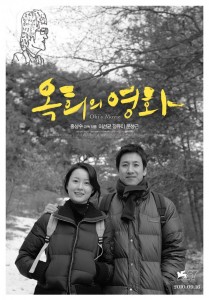 It is fair to say that Hong Sang-soo is a filmmaker who defies the conventions of traditional audience-driven cinema. Hong reached the heights of his international acclaim in the last year following the success of Hahaha, winning the Prix Un Certain Regard at the 2010 Cannes Film Festival over Derek Cianfrance, Xavier Dolan and Jean-Luc Godard.
It is fair to say that Hong Sang-soo is a filmmaker who defies the conventions of traditional audience-driven cinema. Hong reached the heights of his international acclaim in the last year following the success of Hahaha, winning the Prix Un Certain Regard at the 2010 Cannes Film Festival over Derek Cianfrance, Xavier Dolan and Jean-Luc Godard.